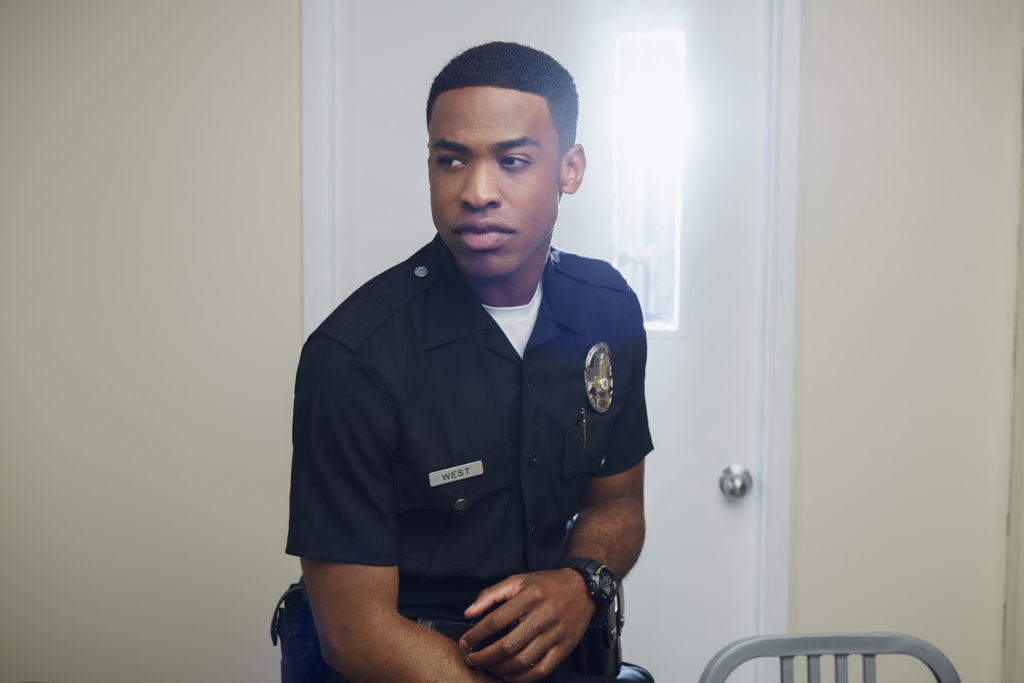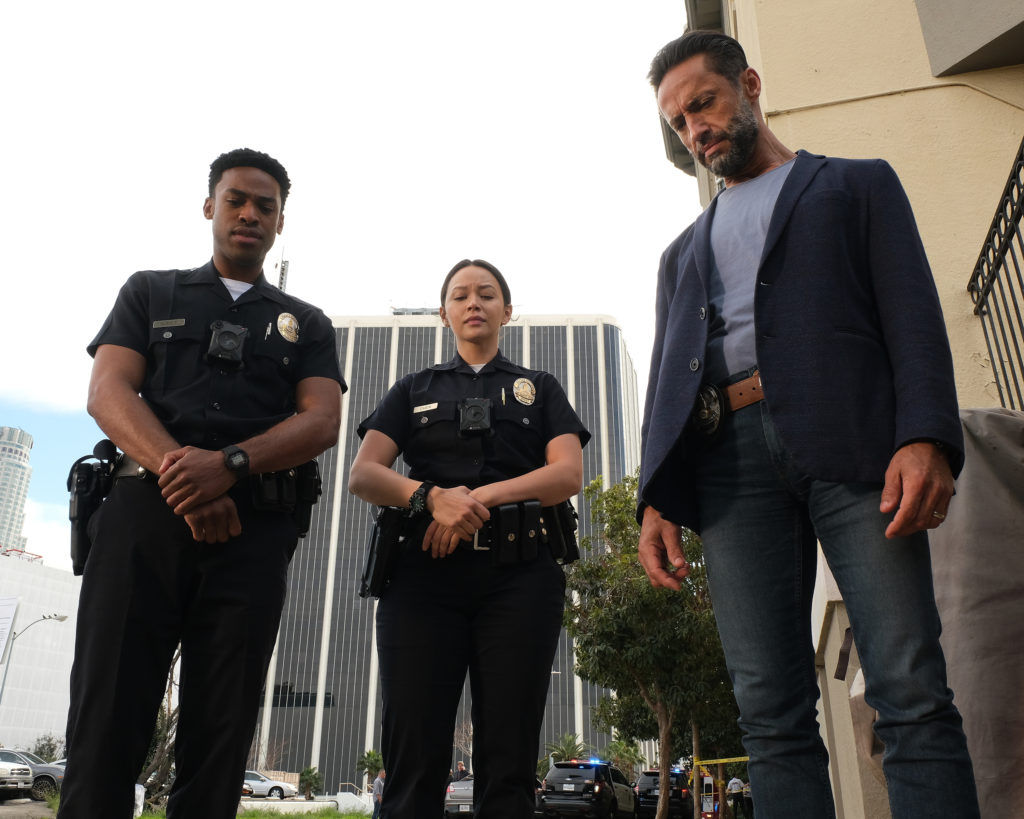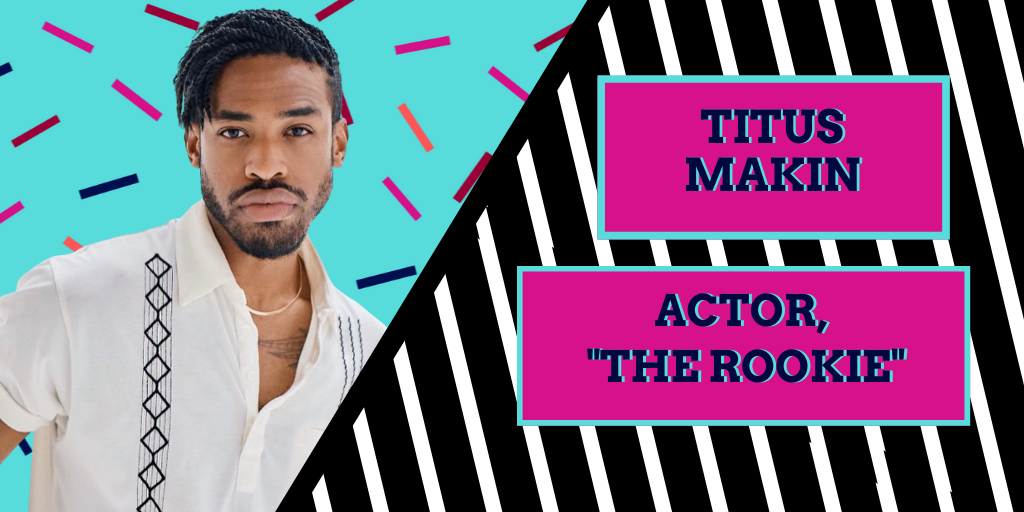The Rookie is one of several police procedurals that are trying to meet the moment of addressing police brutality. The third season of the series has added commentary and instruction from anti-racism organizations Color of Change and Breaking Barriers United to create a season that challenges viewers as well as entertain. Titus Makin, who plays police academy wunderkind Jackson West, is grateful for the series taking the challenge to show policework more realistically head-on.
When I talked to Makin earlier this month, the most we were concerned with was the murder trial for Derek Chauvin, the police officer who murdered George Floyd in 2020. But unfortunately, at the time of publishing this interview, we have had several police-involved shootings in just one week, including the deaths of 20-year-old Duante Wright and 13-year-old Adam Toledo. Sadly, the feelings and opinions covered in this interview have only become more poignant.
Read the conversation I had with Makin below. The Rookie airs Sundays at 10/9c on ABC; Makin’s EP, Preacher’s Kid, is due in June with the first single coming April 23. Follow his music website for updates.
MONIQUE JONES: The Rookie is tackling some pretty heavy topics this season. Your character Jackson s known as the most prepared rookie in the force, and this season is presenting some challenges for him as both a police officer and as a Black man in America. How would you describe your character’s arc this season?
TITUS MAKIN: What we’ve seen thus far since the season’s been airing, we’ve already seen him stand his ground and speak up against police brutality, racial injustice. And we’re at a point now where he was able to get one of the more racist cops fired because of the way he’s treating people in the field. So it’s been a really, really, really great coming of age story for Jackson to see him all the way back in season one, being afraid to shoot his gun, right? And he was afraid of bullets to now be standing his ground for an entire community, his community and against the blue badge itself where it’s like a lot of the times people stay silent. He’s like, “No–even as a cop, this is wrong and I’m standing up not only for the Black community but also for better policing.” It’s been a really evolving story for him in a good way.
I watched the Season 3 sneak peek video that talked about what went into the making of the season, and I saw how Color of Change and Breaking Barriers United were really big influencers for how this season progressed and how certain issues were tackled. First of all, what was it like working with these two groups and having had these conversations with these groups, how do you see The Rookie taking these conversations forward?
I was extremely thankful that they were advocating for us and joining us because we really are trying to continue to have the show be aspirational where it’s saying like, “Hey, we see what’s happening. We’re not going to turn a deaf ear to it.” We’re going to bring light to it, show it for show up for the reality that it is, but also point towards where policing should go and ultimately could go. So, I think with the show, we’re just gonna continue to shine light on real issues, but also keep the heart of it. So it’s not like another special, you know, like turning on the show and it’s [just like] another news broadcast, but where they can learn something, but also find some joy as well.
For my job at Shadow And Act, I had to write about one study from Color of Change that talked about how policing is shown on TV and how it impacts how people view police and excuse the more negative behavior of police. So with that said, it’s interesting that Color of Change is putting this kind of knowledge forward with how to better show these types of issues on TV. With that background, do you think that The Rookie is one of the shows leading the charge or could be one of the shows leading the charge about how people write and think about police shows?
Absolutely. With Season 3, I think we’ve been specifically doing a good job at showing both sides, not just point to the fact that there are [racist] police officers but also pointing to the fact that there are police officers who intend to protect and serve and help people. We can’t always point the finger at when police are bad when the series shows that we have African-American police officers out there that do want to do good, as well as Caucasian and Hispanic and Asian and [other police officers] who want to do good.
But the reality is that we’re still coming out of a systemic issue here [in which] police brutality and racial injustice has always been a thing and it’s getting highlighted even more so right now because we have to see it with camera phones. So I feel like it’s one of those things that I hope the networks and writers are seeing that, “Hey, it’s okay to show the reality.” Obviously, we’re not trying to linger there and make you feel depressed, you know, but it’s also okay. And a lot of movies will [show] there’s always a bad cop or a sneaky cop that a lot of TV shows have glamorized. I’m hoping that we are setting the tone of telling the truth a bit more.

One thing that you said in the video that I thought was really fascinating is that you said that, at the beginning of your time on The Rookie that you were scared to play a cop. If you feel comfortable, can you tell me why that is and what have you learned since?
Yeah. So that was solely because of the reality of how I was raised, where I grew up, the stigma that would come along with that, and obviously knowing that if I do play this cop for having however many years, people automatically would assume I’m a voice of the police force, right. Because a lot of people can’t separate acting from reality and they’ll think you are that character and they don’t realize that it’s fake. I have nothing to do with the storyline, I just act it. But that was where a lot of that fear was coming from, um, is just the fear of having to take on something that I didn’t believe in myself.
But what I’ve learned through this is one, there, there are elements that I was still very correct about, but I’ve also grown a bigger heart and the grace towards the fact that the job is very difficult. Like I learned that I don’t have what it takes to do this. Like, for the pure fact that you have to make quick calls in high-stakes situations that could have, perhaps, strong repercussions based on what you’re trained to decide in a hair of a moment. So I’ve gained a lot of grace. I’ve also been enlightened a lot to learn what to stand against and what to leave alone, you know?
You talked about in Season 3 how there’s already been a racist cop that’s been taken off the force. There’s also been scenes showing the LAPD trying to figure out their place in the community and trying to gain back the community’s trust. What are some things that you think the police in real life can do to gain back the trust of not just Americans, but specifically Black Americans?
I honestly think some of the things that are already starting to happen are forward-moving steps, in my opinion, like, uh, letting it be seen that the cities that do have the police officers that have been 100% okay with being videotaped, marching in solidarity with, uh, black lives and stuff like that, like showing and not being afraid to show that we are not–we being the police, are not going to stand for racial injustice, like making that voice more known as opposed to kind of staying silent.
In some of these towns, um, especially some of the ones that I’m from in the South, they’re not always very vocal. But making that statement, making it a point to start having equality in how they investigate situations and people, just giving [people] the same equality, like asking questions before you start shooting and battering people. Ask more questions first. I think some of the steps are already being taken, but obviously, we have a long way to go with the sense of opening up more conversation.

I don’t know if there’s a question attached to this, but I will say that personally, being Black and watching this all happen and watching all of these years of police brutality, it’s interesting to me–the most loaded sense possible–that it took George Floyd being killed the way he was. The fact that we were in a pandemic when it happened. I don’t know if bizarre is the right word, but it’s just so weird.
I think it had to. In my personal opinion, I think that had some line up the way it did for people to really take a look. Do you know what I mean? Like it had to be, it had to be the time we’re in with technology. It had to be during the pandemic when people are forced to be home more for all watching [the news multiple hours a day], trying to be involved with what’s going on because there’s not much else to do. I feel like it worked. If we didn’t have a pandemic, I honestly don’t feel like it would be, it would have gotten the amount of attention that it deserved for the amount of change that it’s promoted. That’s my personal opinion.
And obviously with technology, I’m like, these things, as you and I know, have been happening for years and years and years, but now that people have a phone and that now I can record it and put it directly on social media, it’s like, you can’t hide behind injustice as much anymore as a police officer. It’s like [if an officer has] literally not turned on [their] body cam and it was off, now I got my cell phone. So what’s your defense now, you know what I mean?
And the reality of this is what I’ve been going back and forth with about how the circumstances had to line up like that. It’s infuriating it had to happen this way–
Yeah. For sure.
But it’s also just like…I don’t know if you want to say divine timing or just the time it was supposed to happen. It’s just a lot.
Yeah. It’s a lot, I totally agree with you. It’s like it’s overall upsetting and frustrating that it’s taken this long for people to really start opening their eyes. But at the same time, it’s like, yeah, it’s been long but at least we are starting to have the conversations that should have happened, honestly, after Martin Luther King was starting to have them. You know, people got back on their high horses, but I’m more happy that we’re in a place where now these conversations are welcome and people care to have them and people of ethnicities that aren’t African-American are open to hearing stuff or seeing stuff for themselves, so at least, that’s happening.
And there’s the fact that people were messaging after George Floyd’s death and it’s like, this has been going on for a long time–why reach out now?
It’s that technology piece again. It’s just like, finally, you can see it for yourself. I even asked one of my Caucasian friends, I said, ‘You know this stuff has always happened.” That’s why a lot of Black people, unfortunately, aren’t as affected because it’s an unfortunate reality that we’re used to. And it’s just another story of somebody being assaulted, killed, murdered, whatever it is because they were Black and we grew up having to live with that reality.
So I was like, “You realize this has always happened.” And he was like, “Yeah, I’ve always heard about stuff, but it’s just different when I can see it for myself. It always seemed like, ‘[there’s] somebody who knows that, but it’s never happened with my close Black friends.’ Like it never really happens around me, so they’re distant from it. But now that it’s in your face and they’re watching it, it’s like they’re appalled that somebody would get treated this way. And it’s like, yeah, it’s been happening forever.
Shifting gears a bit, I did read how you have a music career outside of acting. Your latest song, “Pray for ‘Em,” is a song that’s about some of what we’ve been talking about. How would you say your music informs your activism or vice versa, how does it mesh with your acting life, how does that all intersect?
I really don’t think it meshes too much with the acting side of things, but, um, for my own personal voice as opposed to, you know, writing a long caption on Instagram about my thoughts or making an Instagram video. I personally like to put my thoughts about these topics in my music. So it’s kind of been my way of either venting or educating or just showing my heart and culturally encouraging some people to broaden their mindsets as well. So I just use it as, I guess, my public diary, in a sense.
I guess this could be like a two-fold question with The Rookie and your song, but what do you hope people take from your message of activism and pushing forward?
Well, I hope that they take away the open heart to converse, to ask questions, to start conversation in their own households. [I want people to be like] “Oh, I heard that song–what is he talking about in that song?”I want it to start conversation. I want it to really, challenge people’s mindsets when it comes to how they have viewed racial justice or racism in general in the past.
And then with the show, because of what Jackson’s doing, he’s finding his own voice as a black man where he is just now finding his confidence to stand up against racial injustice and police brutality. So it goes hand in hand and that sense as to the activism of both sides, the music and Jackson on the show.
